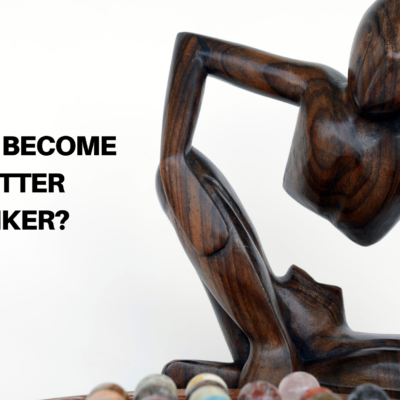How to Become a Better Thinker: In a World that is filled with information and constant triggers, the ability to think creatively has become more useful than ever. Becoming a better thinker includes mental skills, welcoming diverse viewpoints, and adopting a mindset that promotes curiosity and constant learning.
Hence, in this article, we will talk about the fundamental aspects of improving one’s thinking abilities and provide a practical understanding of how to become a better thinker.
Also Read:
- Positive Mental Health Habit that will Change Your Life.
- How to Practice Gratitude at Work?
- How to avoid being competitive at work?
- How to Achieve a Goal?
- How to Deal with Internet Addiction?
How to Become a Better Thinker?
Have Curiosity
At the core of becoming a better thinker is an insatiable curiosity. Develop a mindset that strives to understand, question, and explore. Ask why, and how. Curiosity fuels the craving to learn and challenges traditional learning. By keeping a curious perspective, you open the door to new ideas, standpoints, and possibilities for intellectual growth.
Read As Much As You Can
Reading is a strong tool for developing one’s thinking abilities. Engage with a wide range of books, articles, essays, and even fiction stories. Exposure to various viewpoints and subjects improves mental flexibility and enables you to connect ideas across various domains.
Develop Critical Thinking Skills
Critical thinking is the ability to analyze, assess, and synthesize information. Sharpen this skill by questioning assumptions, evaluating different viewpoints, and evaluating the credibility of data.
Challenge your own thoughts and be open to changing your mind based on proof and reasoned argumentation. Critical thinking is a basis for practical decision-making and problem-solving.
Practice Mindfulness
In the busy life that we are living, it is easy to surrender to the demands of the moment without reflecting on the broader context. Being present and aware of the moment can improve your thinking by promoting transparency and focus. Keep some time in a day to reflect, whether through meditation or journaling, it will help you to gain insights into your thoughts, feelings, and experiences.
Engage in Thoughtful Conversation
By actively participating in thoughtful conversations, you purify your own ideas, learn from others, and create the ability to communicate and defend your thoughts.
Seek Different Outlooks
Surround yourself with people who have different backgrounds, experiences, and perspectives. Exposure to various viewpoints encourages creative thinking and enhances your understanding of the world. Actively seek out conversations with people who may challenge your ideas, promoting an environment where academic growth can thrive.
Develop Problem-Solving Skills
Problem-solving is an essential part of effective thinking. Break down complex issues into effortless elements, identify possible solutions, and evaluate their feasibility. Embrace an aggressive strategy for problem-solving by considering challenges as opportunities for growth. With each problem addressed, your thinking abilities become more refined and adaptive.
Adopt a Lifelong Learning Mindset
The quest for knowledge should not be limited to a specific period of life. Commit to lifelong learning by staying curious, taking on new challenges, and continuously growing your skill set.
Adopt new technologies, enroll in different courses that you are interested in, attend workshops, and seek out experiences that expose you to novel ideas. The purpose of knowledge keep your mind agile and encourage a growth-oriented mindset.
Boost Creativity
Creativity is an important part of becoming a better thinker. Explore various forms of creative expression, whether through writing, art, music, or other platforms. Creativity includes thinking beyond traditional limits, permitting the generation of innovative ideas. By boosting your creative side, you improve your capability to approach difficulties with fresh outlooks.
Enhance Decision-Making Skills
Practical thinking is closely linked to sound decision-making. Develop decision-making skills by collecting suitable information, considering choices, and considering possible outcomes. Welcome both analytical and instinctive approaches, acknowledging that optimal decisions usually include a combination of rational research and gut instinct.
Assess Your Thinking
Regularly assess your thought processes and reflect on your experiences. Consider what worked well and what could be improved. By engaging in critical reflection, you purify your thinking habits, learn from past blunders, and determine areas for growth. This self-awareness contributes to constant progress in your mental capabilities.
Build Mental Strength
Becoming a better thinker needs mental strength to handle challenges and setbacks. Adopt a positive mindset, view obstacles as opportunities to learn, and grow the ability to bounce back from failures. A resilient mind is more adaptable and better prepared to approach problems with transparency and persistence.
Foster Intellectual Humility
Intellectual humility includes recognizing the limits of your knowledge and being open to learning from others. Welcome the idea that there is always more to learn and appreciate the variety of thought. Developing academic humility promotes a collective mindset, allowing you to engage in meaningful conversations and learn from a different range of viewpoints.
Develop Time Management Skills
Effective thinking needs time and focus. Improve your time management skills to allocate dedicated periods for deep thinking and reflection. Remove or minimize distractions, prioritize tasks, and create a facilitative environment for focused thought. By organizing your time effectively, you maximize the quality of your thinking.
Highlight Constant Progress
The journey to becoming a better thinker is a constant process of improvement. Regularly evaluate your thinking habits, take feedback from others, and be open to adjusting your approach. Highlight a growth mindset, acknowledging that intelligence and thinking abilities can be acquired over time with effort and dedication.








